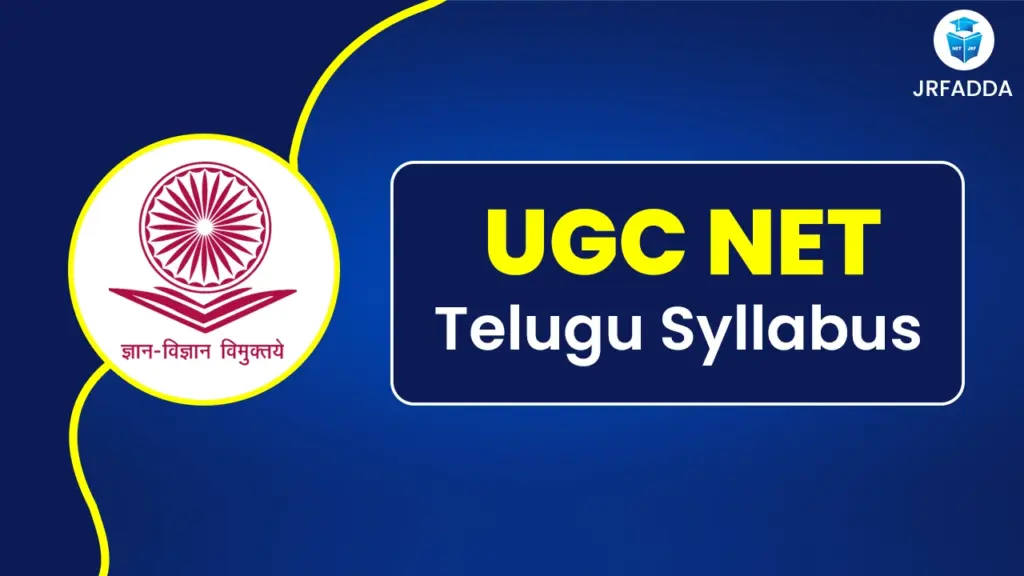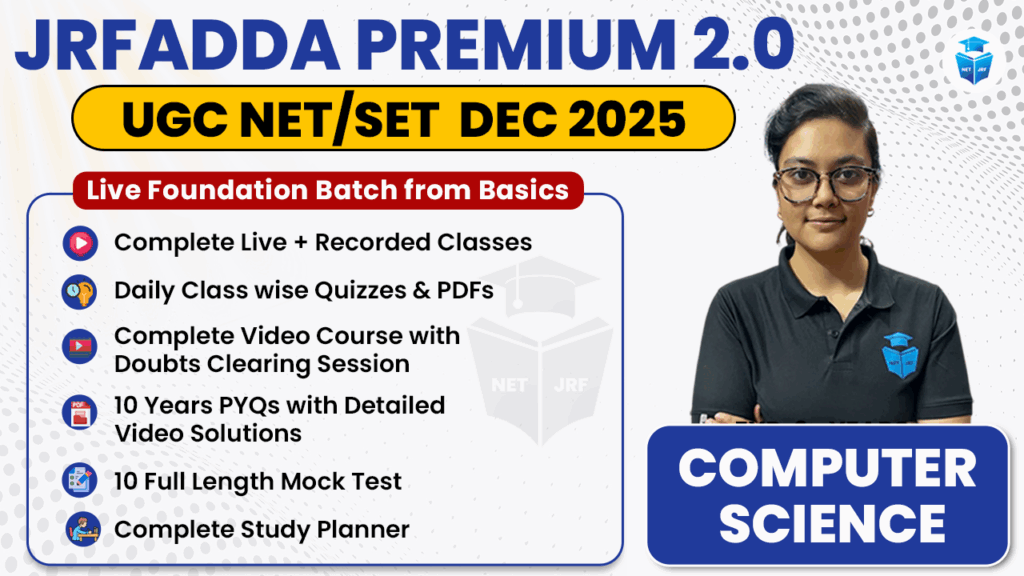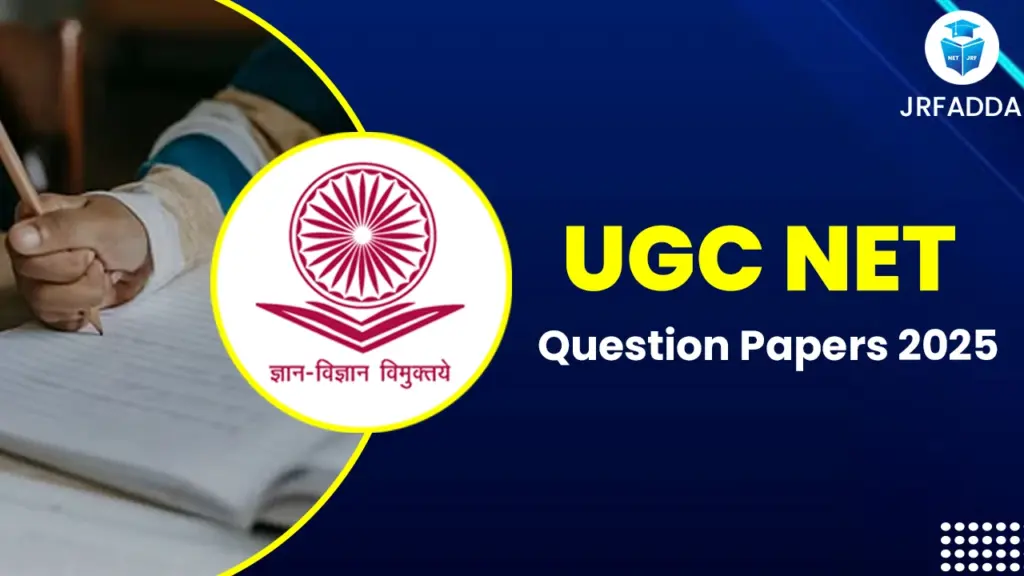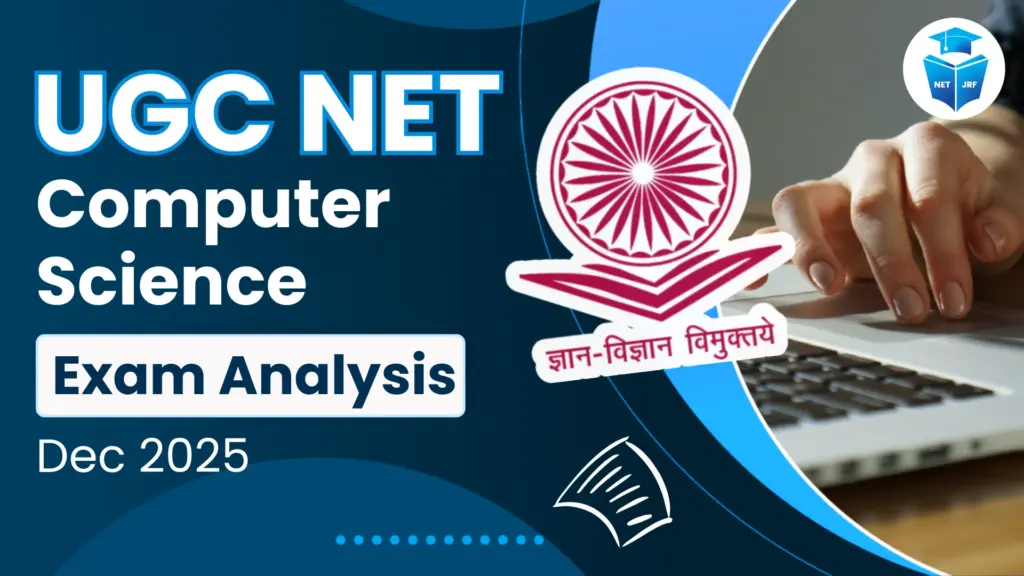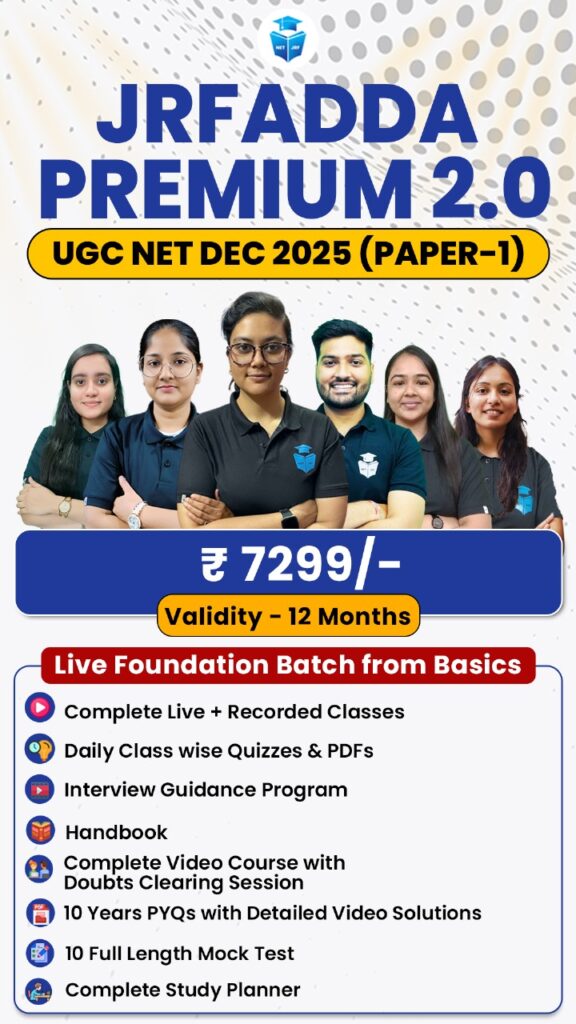The National Testing Agency (NTA) has officially released the UGC NET Telugu Syllabus 2025 for aspirants aiming to qualify for roles like Assistant Professor and Junior Research Fellowship (JRF). The subject code for Telugu is 27. The syllabus is divided into ten thorough units spanning traditional to modern Telugu literary studies, including grammar and critical theory.
UGC NET Telugu Syllabus 2025 Overview
| Feature | Details |
| Exam Name | UGC NET 2025 |
| Conducting Body | National Testing Agency (NTA) |
| Purpose | Eligibility for Assistant Professor & JRF |
| Exam Frequency | Twice a year |
| Exam Mode | Computer-Based Test (CBT) |
| Medium of Exam | Telugu |
| Total Duration | 3 Hours (180 Minutes) |
| Papers | Paper I (General) & Paper II (Telugu) |
| Subject Code | 27 |
| Expected Dates | 21 June to 30 June 2025 (Tentative) |
| Official Website | ugcnet.nta.nic.in |
Also Read: UGC NET June 2025
UGC NET Telugu Syllabus PDF Download
To prepare efficiently, candidates should download the official UGC NET Telugu Syllabus 2025 PDF released by the NTA. This PDF outlines each topic in detail under every unit and is essential for structured preparation.
| Download UGC NET Telugu Syllabus 2025 PDF |
UGC NET Syllabus Paper 1 Unit Wise
Paper 1 is common to all candidates and evaluates teaching and research aptitude along with reasoning and comprehension skills.
| Unit No. | Topic | Description |
| 1 | Teaching Aptitude | Nature, objectives, learner traits, teaching methods |
| 2 | Research Aptitude | Research types, methodology, ethics, thesis writing |
| 3 | Comprehension | Interpretation-based reading comprehension |
| 4 | Communication | Types, barriers, classroom communication |
| 5 | Mathematical Reasoning & Aptitude | Series, ratio, averages, time-speed-distance, DI |
| 6 | Logical Reasoning | Analogies, Venn diagrams, syllogisms |
| 7 | Data Interpretation | Tables, charts, graph analysis |
| 8 | ICT | Basics of ICT, e-learning, digital tools |
| 9 | People, Development & Environment | Sustainability, conservation, environmental issues |
| 10 | Higher Education System | Governance, policies, historical development |
Download UGC NET Paper I Syllabus 2025 PDF
| UGC NET Paper I Syllabus 2025 | |
| English | Hindi |
UGC NET Telugu Syllabus Paper 2 Unit Wise
Paper 2 is subject-specific and focuses exclusively on Telugu literature, linguistics, grammar, poetics, and folklore studies.
| Unit | Title | Subtopics (in English) |
| Unit 1 | Early Malayalam Literature (Origin) | – Song literature: characteristics, evolution, major works
– Manipravalam: definition, acceptance, examples from early and medieval periods – Other forms: Gatha, Kilippattu, Pana, Nanchipattu – Prose types: Scientific prose, translated prose, mythological prose – Mahakavyas, Khandakavyas, Muktakas – Literary regions and traditions (Travancore, Cochin, Malabar) |
| Unit 2 | Modern Malayalam Poetry (Post-1800) | – Imaginative poetry: origin, development, major works
– Counter-imagination, social responsibility in poetry – Notable modern poets and their contributions – Contemporary poetry: Dalit, Feminist, Ecopoetry |
| Unit 3 | Narrative Literature (Stories and Novels) | – Short stories: origin, historical phases, key works
– Novels: emergence, major developments, types of novels – Literary and historical relevance of the genres |
| Unit 4 | Visual Literature & Performing Arts | – Performing literature: Kathakali stories, content and style
– Therukoothu (street plays), evolution, types, features – Malayalam drama: origin, early forms, contemporary & political dramas (Dalit, feminist, environmental) – Screenplays and cinema narratives |
| Unit 5 | Folklore Studies | – Folklore: definition, theory, methods, impacts
– Folk narratives: Slang stories, legends, oral history, songs – Ritualistic forms: Parachil, Padayani, Mudiyettu, Theyyam, etc. |
| Unit 6 | Literary Criticism in Malayalam | – Reviews, evaluations, stylistic analysis in early journals
– Critical traditions and major critics in Malayalam – Influence of Western theories (narrative, poetry, genres) – Contemporary perspectives (Dalit, feminist, environmental criticism) |
| Unit 7 | Miscellaneous Literary Genres | – Biography, autobiography, travelogues, satire
– Children’s literature, subaltern literature – Comparative literature studies |
| Unit 8 | Linguistics & Grammar | – Historical methods of language study
– Phonology, Morphology, Syntax, Semantics – Sociolinguistics, Psycholinguistics, Applied Linguistics – Dravidian grammar and Malayalam grammar: syntax, case markers, tenses, compounds, etc. |
| Unit 9 | Literary Theories and Aesthetics | – Classical Indian aesthetics: Rasa, Dhvani, Alankara, etc.
– Western literary theories: Classicism, Realism, Marxism, Feminism, Structuralism, Post-Structuralism, Postmodernism, Dalit theory, Eco-criticism, etc. |
| Unit 10 | Kerala Cultural Studies | – Cultural theory and its relevance to Kerala
– Political, religious, and social influences – History of resistance, social reform movements, nationalist period – Role of press, print culture, education, and language policies |
Also Read: UGC NET Syllabus 2025 PDF Download
యూనిట్ శీర్షికలు మరియు ఉపవిషయాలు
యూనిట్ 1
ప్రారంభ మలయాళ సాహిత్యం (ఉత్పత్తి)
- పాటల సాహిత్యం: లక్షణాలు, అభివృద్ధి, ప్రధాన రచనలు
- మనిప్రవాళం: నిర్వచనం, స్వీకారం, ప్రాచీన మరియు మధ్యయుగ ఉదాహరణలు
- ఇతర రూపాలు: గాథ, కిలിപ്പാട്ടు, పాన, నంచిపట్టు
- గద్య రకాలూ: శాస్త్రీయ గద్యము, అనువాద గద్యము, పౌరాణిక గద్యము
- మహాకావ్యాలు, ఖండకావ్యాలు, ముక్తకాలు
- సాహిత్య ప్రాంతాలు మరియు సంప్రదాయాలు (త్రివాంద్రం, కోచిన్, మలబార్)
యూనిట్ 2
ఆధునిక మలయాళ కవిత్వం (1800 తరువాత)
- కల్పిత కవిత్వం: ఉద్భవం, అభివృద్ధి, ప్రముఖ రచనలు
- ప్రత్యామ్నాయ కల్పన, కవిత్వంలోని సామాజిక బాధ్యత
- ప్రసిద్ధ ఆధునిక కవులు మరియు వారి కృషి
- సమకాలీన కవిత్వం: దళిత్, స్త్రీవాద, పర్యావరణ కవిత్వం
యూనిట్ 3
కథా సాహిత్యం (కథలు మరియు నవలలు)
- కథలు: ఉద్భవం, చారిత్రక దశలు, ప్రముఖ రచనలు
- నవలలు: పుట్టుకొచ్చిన విధానం, అభివృద్ధి, రకాలు
- ఈ ప్రక్రియల సాహిత్య మరియు చారిత్రక ప్రాముఖ్యత
యూనిట్ 4
దృశ్య సాహిత్యం మరియు ప్రదర్శన కళలు
- ప్రదర్శనా సాహిత్యం: కథకళీ కథలు, విషయవస్తువు మరియు శైలి
- తెరుకూతు (వీధి నాటకాలు): అభివృద్ధి, రకాలు, లక్షణాలు
- మలయాళ నాటకాలు: ఉద్భవం, ప్రాచీన రూపాలు, సమకాలీన మరియు రాజకీయ నాటకాలు (దళిత్, స్త్రీవాద, పర్యావరణ)
- స్క్రీన్ ప్లేలు మరియు సినిమా కథనం
యూనిట్ 5
జనపద అధ్యయనాలు
- జనపదం: నిర్వచనం, సిద్ధాంతం, పద్ధతులు, ప్రభావాలు
- జానపద కథలు: స్లాంగ్ కథలు, పురాణాలు, మౌఖిక చరిత్ర, పాటలు
- ఆచరణాత్మక రూపాలు: పరకిల్, పదయాని, ముడియెట్టు, తేయ్యం మొదలైనవి
యూనిట్ 6
మలయాళంలో సాహిత్య విమర్శ
- ప్రాథమిక పత్రికల్లో సమీక్షలు, మూల్యాంకనాలు, శైలీ విశ్లేషణ
- విమర్శా సంప్రదాయాలు మరియు ప్రముఖ విమర్శకులు
- పాశ్చాత్య సిద్ధాంతాల ప్రభావం (కథనం, కవిత్వం, ప్రక్రియలు)
- సమకాలీన దృక్కోణాలు (దళిత్, స్త్రీవాద, పర్యావరణ విమర్శ)
యూనిట్ 7
ఇతర సాహిత్య ప్రక్రియలు
- జీవిత చరిత్రలు, ఆత్మకథలు, ప్రయాణ కథనాలు, విపరిత హాస్యం
- పిల్లల సాహిత్యం, పిచ్చిమాత (సబాల్టెర్న్) సాహిత్యం
- తులనాత్మక సాహిత్య అధ్యయనాలు
యూనిట్ 8
భాషాశాస్త్రం మరియు వ్యాకరణం
- భాష అధ్యయనంలో చారిత్రక పద్ధతులు
- ధ్వనిశాస్త్రం, రూప శాస్త్రం, వాక్య నిర్మాణం, అర్థశాస్త్రం
- సామాజిక భాషాశాస్త్రం, మనోభాషాశాస్త్రం, అనువర్తిత భాషాశాస్త్రం
- ద్రావిడ వ్యాకరణం మరియు మలయాళ వ్యాకరణం: వాక్య నిర్మాణం, విభక్తులు, కాలాలు, సమాసాలు మొదలైనవి
యూనిట్ 9
సాహిత్య సిద్ధాంతాలు మరియు రసాస్వాదన
- భారతీయ సంప్రదాయాల రస శాస్త్రం: రస, ధ్వని, అలంకార మొదలైనవి
- పాశ్చాత్య సాహిత్య సిద్ధాంతాలు: క్లాసిసిజం, రియలిజం, మార్క్సిజం, ఫెమినిజం, స్ట్రక్చరలిజం, పోస్ట్-స్ట్రక్చరలిజం, పోస్ట్మోడర్నిజం, దళిత్ సిద్ధాంతం, పర్యావరణ విమర్శ మొదలైనవి
యూనిట్ 10
కేరళ సాంస్కృతిక అధ్యయనాలు
- సాంస్కృతిక సిద్ధాంతం మరియు కేరళకు సంబంధితత
- రాజకీయ, మతపరమైన, సామాజిక ప్రభావాలు
- నిరసన చరిత్ర, సామాజిక సంస్కరణ ఉద్యమాలు, జాతీయవాద దశ
- మాధ్యమం, ముద్రణ సంస్కృతి, విద్య, భాషా విధానాల పాత్ర
Also Read: UGC NET Previous Question Papers PDF
UGC NET Telugu Exam Pattern 2025
The exam comprises two papers held in a single session:
| Papers | Number of Questions | Marks | Question Type | Duration |
| Paper 1 | 50 | 100 | General Aptitude (MCQs) | 3 Hours |
| Paper 2 | 100 | 200 | Telugu Subject (MCQs) | 3 Hours |
Also Read: UGC NET Exam Pattern
Tips to Crack UGC NET Telugu Exam 2025
- Start Early: Lay a strong foundation during your academic years.
- Stick to Syllabus: Focus on UGC NET Telugu Syllabus 2025 and university-level curriculum.
- Create a Study Schedule: Divide your time for reading, revision, and mock practice.
- Use Past Papers: Understand commonly asked patterns and high-weightage areas.
- Take Mock Tests: Get familiar with CBT format and improve time management.
- Master Literature & Linguistics: Read both primary texts and secondary criticism.
- Stay Healthy: Take breaks and ensure regular rest for better retention.
Conclusion
The UGC NET Telugu Syllabus 2025 offers a detailed roadmap for candidates pursuing eligibility for Assistant Professor and JRF positions. Spanning ancient to modern Telugu literature, grammar, poetics, and linguistics, the syllabus ensures a deep and structured preparation path. Download the official syllabus PDF, study unit-by-unit, and use recommended resources to improve your exam performance.
UGC NET Telugu Syllabus 2025 FAQs
What are the major topics in the UGC NET Telugu Paper 2 syllabus?
The syllabus includes ancient and modern Telugu literature, grammar, linguistics, literary theory, drama, poetry, essays, and folklore.
Is the UGC NET Telugu Syllabus updated every year?
Minor changes may occur, but core topics remain consistent. Always check the NTA website for the latest version.
How many questions are there in Paper 2 for Telugu?
There are 100 objective questions in Paper 2, each carrying 2 marks.
Does the syllabus include both classical and modern Telugu works?
Yes, both classical epics and modern literary contributions are included.
What are the best strategies to prepare for the UGC NET Telugu exam?
Focus on original texts, revise theory concepts, practice old papers, and refer to expert-recommended books.

